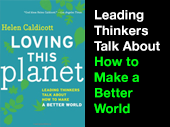To Our Listeners:
Welcome to If You Love This Planet Radio. We will occasionally feature new programs including my recent lectures and proceedings of conferences. Please enjoy our archive of nearly 200 interviews. The complete catalog of programs available for listening and downloading is on the Archives page. A book of 25 of my interviews called Loving This Planet may interest you. I am now concentrating on other new initiatives of The Helen Caldicott Foundation , including a two-day international symposium on the risk of nuclear war between the U.S. and Russia, to be held February 28-March 1 2015 at the New York Academy of Medicine. Watch this space for registration details on this important conference, The Dynamics of Possible Nuclear Extinction, which will be open to the public. And be sure to visit nuclearfreeplanet.org for news, reports and other resources related to the work of my foundation.
Helen Caldicott, M.D.
December 2nd, 2008

Photo: Lockheed Martin

Photo: Space4Peace.org
The U.S. Missile Defense system, enthusiastically promoted by the outgoing Bush administration, has long been met with criticism and doubt within the scientific community. In this episode, Dr. Caldicott talks with Dr. Ted Postol, Professor of Science, Technology and National Security Policy in the Program in Science, Technology, and Society at Massachusetts Institute of Technology. Dr. Postol, winner of the 2001 Norbert Weiner award from Computer Professionals for Social Responsibility, has defiantly uncovered numerous false claims about missile defense made by his employer, which he claims is “representing a weapons system they know will not work as something that will work.”
He describes how the idea of a missile defense system fits in with U.S. strategic nuclear policy and how such a system is dangerously flawed. Dr. Postol and Dr. Caldicott talk about how Russia and China perceive America’s new missile-defense installations in Poland and Czechoslovakia, moves which Dr. Postol calls “worse than irrational.” Dr. Postol says that any nuclear weapons accident occurring at a time of heightened tension between the U.S. and Russia would be more catastrophic than anything the human race has ever experienced. He mentions the 1995 false alarm that brought the world close to nuclear annihilation when a sounding rocket set off the early-warning system of Russia. Read Going Postol in the Boston Globe Magazine about Dr. Postol’s issues with MIT.
The hour concludes with Dr. Caldicott’s summary of missile defense or “Star Wars,” which she calls “crazy, provocative, and dangerous,” from the time Ronald Reagan introduced the idea in 1984 - at a time of nearly unanimous public support for global nuclear disarmament - to the present. She outlines how this “useless program” has mostly benefited universities, to the tune of $100 billion. There are signs that missile defense development will continue under the Obama administration, especially if the pro-Star Wars Robert Gates is retained as Defense Secretary. She describes the new $38 billion missile defense office complex to be opened in 2010 near Washington, D.C. Read the Time magazine article Why Obama Will Continue Star Wars.
Listen Now Download the show by right-clicking the link.
Posted in Uncategorized | Comments Off
October 27th, 2008

Helen Caldicott, M.D. on her fall 2008 lecture tour. Photo: Jasmin Williams
Dr. Caldicott spoke October 12 at First Congregational Church in Long Beach, California. In this lecture, she discusses the urgent nature of the November presidential election, which she says will determine the fate of the earth. She outlines the three major threats facing humanity - global warming, nuclear war, and nuclear power - and provides a plan for solving each of these problems. During the lecture, Dr. Caldicott refers to a map given to lecture attendees showing the extent of radioactive contamination in Europe from the Chernobyl nuclear accident. A similar map can be found here. She also mentions her book, Nuclear Power Is Not The Answer, and says the report Carbon-Free and Nuclear-Free: A Blueprint for U.S. Energy Policy is an essential roadmap for addressing global warming.
Listen Now Download the show by right-clicking the link.
Posted in Uncategorized | Comments Off
October 20th, 2008
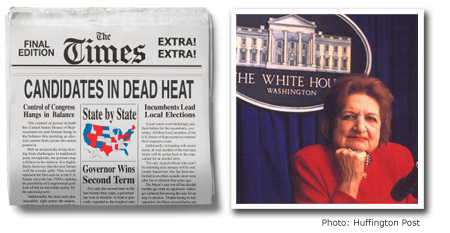
Helen Thomas is a respected journalist who served for 57 years as a correspondent and later, as White House bureau chief for United Press International. In 2000, Helen Thomas became a columnist at the Hearst News Service, where she still works. Read her latest columns here. She has written four books including Watchdogs of Democracy?: The Waning Washington Press Corps and How It Has Failed the Public.
In 2007, she laid the blame on President Bush for launching the Iraq War as his “war of choice” and lamented that the “gutless-wonder Congress doesn’t have the courage to do what it needs to do” to end the war.
In this frank discussion with Dr. Caldicott, Thomas recalls all the presidents she has covered from John F. Kennedy to George W. Bush, and talks about the current political climate in the United States. She conveys her admiration of Barack Obama and her fears about Sarah Palin, whom she describes as “to the right of McCain”. She spells out why the U.S. media have backed down from confronting the administration since September 11, and recounts the many times she has seen the world close to nuclear catastrophe.
The last quarter of the show is an excerpt of Dr. Caldicott’s October 2008 presentation to Canadian medical professionals about nuclear power and the effects of global warming, in which she outlines how a “prescription for survival” for the planet must include following the downloadable report Carbon-Free and Nuclear-Free, A Roadmap for U.S. Energy Policy (2007).
Listen Now Download the show by right-clicking the link.
Posted in Uncategorized | Comments Off
October 13th, 2008

The contamination caused by nuclear power generation and nuclear weapons production has created some of the most toxic places on earth. Ever-more-dangerous radioactive waste and epidemics of cancer may be in store if the Bush administration’s agenda for worldwide nuclear-waste “recycling” is implemented in the years to come. What exactly is the Global Nuclear Energy Partnership (GNEP), introduced by George W. Bush in 2006? What is involved in the reprocessing of nuclear materials, and what are the far-reaching medical and public health ramifications of this process? These are some of the questions Dr. Caldicott puts to Robert Alvarez in this revealing interview.
Alvarez is Senior Scholar at the Institute for Policy Studies in Washington D.C. and a national award winning writer. Between 1993 and 1999, he served as Deputy Assistant Secretary for National Security and Environmental Policy and was the Senior Policy Advisor to the U.S. Secretary of Energy. Alvarez has recently authored an in-depth analytical report on the GNEP. Read Alvarez’s articles Magical Thinking About Nuclear Waste and Nuclear Recycling Fails the Test. Also see Reframing reprocessing: Miracle of recycling, or nightmare of proliferation?
Alvarez and Dr. Caldicott also examine how the Bush administration has reignited the Cold War with Russia, how U.S. nuclear weapons laboratories are pressing to resume lucrative bomb production with the mentality of a cargo cult, and why nuclear disarmament could still be achieved with sufficient political will.
After a music break, the show concludes with a clip from a presentation by Tom Rosenstiel, Director of the Project for Excellence in Journalism, at a Washington, DC symposium organized by the Nuclear Policy Research Institute in 2004. Rosenstiel explains how the information revolution is leaving the public less informed about critical issues.
Listen Now Download the show by right-clicking the link.
Posted in Uncategorized | Comments Off
October 6th, 2008
Listen Now Download the show by right-clicking the link.

Photo Credit : ballona.org, wilshirecenter.com
Richard Heinberg is the Director of the Post Carbon Institute, a non-profit organization in California that conducts research, educates the public, and organizes leaders to help communities around the world understand and respond to the challenges of fossil fuel depletion and climate change. In this engrossing discussion with Dr. Caldicott, Heinberg explains the situation of Peak Oil, and reminds us just how reliant our society is on the finite resources of oil, coal and gas. We are reaching a state where the depletion of these fossil fuels will force us to undergo a major transition to low-energy and re-localized societies with food grown and products made close to home. Heinberg describes how transportation will need to change - currently oil is responsible for 95% of transportation technologies in the United States. Heinberg is the author of Peak Everything: Waking Up to the Century Of Declines, Powerdown: Options and Actions for a Post-Carbon World and other books. He is featured in the documentary films The End of Suburbia and The 11th Hour. Read his articles The View From Oil’s Peak and What Will We Eat as the Oil Runs Out. This program is a startling conversation about the energy crisis with one of the clearest thinking environmental commentators today. The show concludes with a clip of a speech by Pulitzer-Prize-winning journalist James Sterngold, who contends there is insufficient media coverage of nuclear threats. Read Sterngold’s 2008 article in Mother Jones about nuclear weapons here.
Posted in Uncategorized | Comments Off
September 29th, 2008
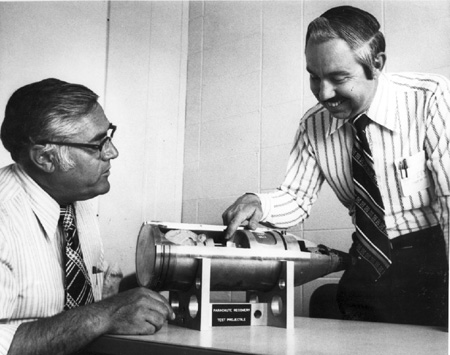
Photo Credit: Department of Energy (courtesy Natural Resources Defense Council)
In this fascinating conversation, respected anthropologist, author and lecturer Professor Hugh Gusterson from the Massachusetts Institute of Technology delves into the psychology of nuclear weapons scientists and designers. Drawing on his extensive field research at U.S. weapons laboratories Lawrence Livermore and Los Alamos, Prof. Gusterson discusses with Dr. Caldicott the moral and emotional approach of the weapons designers; the terminology used among the scientists which is not only thick with metaphors of birth and fertility, but also denies death (weapons victims would be “carbonized,” not incinerated); and the present recruitment by the Department of Energy of anthropologists to be involved in counterinsurgency. His books include Nuclear Rites: A Weapons Laboratory at the End of the Cold War, People of the Bomb: Portraits of America’s Nuclear Complex and Why America’s Top Pundits are Wrong.
Listen Now Download the show by right-clicking the link.
Posted in Uncategorized | Comments Off
September 22nd, 2008

As Dr. Caldicott says during this show, the risk of unabated global warming is now “beyond serious.” The burning of coal, which is rapidly increasing in China and elsewhere, is the single largest factor set to increase emissions and the Greenhouse Effect. How are melting ice caps and mountaintop coal removal related? This program’s two segments provide the answer.
The world’s leading - and most politically outspoken - climate researcher, Dr. James Hansen from NASA’s Goddard Institute for Space Studies is a meteorologist, physicist, and university professor who has led the charge for over 20 years to take global warming seriously. Dr. Hansen and Dr. Caldicott discuss the critical environmental problems facing the planet due to the effects of global warming, and how the most catastrophic warming effects can be averted by stopping all coal emissions now.

Next, Dr. Caldicott speaks with John Johnson, an activist based in Knoxville, Tennessee, whose organization Katuah Earth First! fights the increasingly widespread mountaintop coal removal practices which have devastated over 1 million acres in southern Appalachia, where entire landscapes are obliterated and local culture is destroyed, leaving only barren moonscapes. Johnson has written that mountaintop removal is “. . .an extreme form of coal mining that involves blasting the tops off of ancient mountains, burying freshwater streams with rubble and flattening the world’s most biologically diverse temperate forest.” For more information, see the websites of Mountain Justice and I Love Mountains (on this site, enter your zip code under “What’s Your Connection to Mountaintop Removal?” to see if your local power is derived from leveling mountains).
Listen Now Download the show by right-clicking the link.
Posted in Uncategorized | Comments Off
September 15th, 2008

Australian Catholic author and historian Paul Collins resigned from the active priestly ministry of the Catholic Church in 2002 following a doctrinal dispute with the Vatican’s Congregation of the Doctrine of the Faith about his book, Papal Power. In this interview, Collins talks with Dr. Caldicott about his “environmental conversion,” and his experience living and working in Michigan. Collins, who has a Masters degree in theology from Harvard University, is also the author of God’s Earth: Religion as if Matter Really Mattered (1995), and he writes regularly for The Australian, The Sydney Morning Herald and The Age. Collins ponders the link between capitalism and environmental degradation, describes the Catholic Church’s attitude toward environmental issues, and explains how the church came to be so opposed to contraception.
Listen Now
Posted in Uncategorized | Comments Off
September 8th, 2008
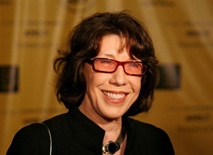
One of America’s most loved writers, comediennes and actresses, Lily Tomlin talks with her long-time friend Dr. Caldicott about the current political climate in the U.S. and her sense of desperation about the direction the U.S. administration is taking. Tomlin reminisces about her experiences in the peace movement after meeting Dr. Caldicott, and describes her childhood and early creative influences in Detroit, Michigan. Tomlin is one of the featured commentators / bloggers on The Women on the Web, “A New Way for Women to Talk Culture, Politics & Gossip.”
Listen Now
Posted in Uncategorized | Comments Off
September 1st, 2008

Sellafield nuclear plant in England
Long time peace activist and Chair of the Campaign for Nuclear Disarmament in the United Kingdom, Dr. Kate Hudson talks to Dr. Caldicott about the nuclear energy industry in England, weapons proliferation, and her new book CND - Now More than Ever: The Story of a Peace Movement. This episode also features an excerpt from a speech given by Joseph Cirincione, then Senior Director, Non-Proliferation Project, Carnegie Endowment for International Peace.
Listen Now
Posted in Uncategorized | Comments Off
August 25th, 2008

Anti-globalization champion Naomi Klein talks about her new book, The Shock Doctrine: The Rise of Disaster Capitalism. A respected author and columnist, Klein has written three published works including her previous best-seller No Logo: Taking Aim at the Brand Bullies. In this conversation with Dr. Caldicott, we discover what drives Klein’s interest in the corporate and international marketplace, and take a closer look at the “disaster capitalism” taking place around the world.
This episode also features an excerpt from the filmnHelen’s War: Portrait of a Dissident, produced by Dr. Caldicott’s niece Anna Broinowski. In the excerpt, you will hear clips of interviews with Martin Sheen, Lily Tomlin, Senator Ted Kennedy and the late Christopher Reeve.
Listen Now
Posted in Uncategorized | Comments Off
August 18th, 2008

Kevin Kamps is a radioactive waste specialist at Beyond Nuclear. Here he discusses the environmental and medical risks associated with low-, medium- and high-level nuclear waste, and other issues surrounding transportation and storage. Nuclear waste, whether in reactors, transported in terrorist-target “Mobile Chernobyl” trucks, trains and barges, or sent to the proposed Yucca Mountain dumpsite, could cause a radioactive disaster. Kamps is the country’s leading expert on all aspects of nuclear waste, the Achilles heel of the nuclear industry. This is a terrific interview, listen to it and you will learn much that you never knew before.
Listen Now
Posted in Uncategorized | Comments Off
August 11th, 2008

Harvey Wassermanis a respected author and political activist whose book Solartopia is a vision of what the world will look like when we switch to renewable energy sources. A pioneer since 1973 of the global grassroots movement against atomic reactors, Wasserman is now Senior Editor of the Free Press
. In this interview, he discusses our current dire global situation, and also talks about his new book,
How the GOP Stole America’s 2004 Election and is Rigging 2008. Wasserman is one of the United States’ most experienced anti-nuclear campaigners and one of the leading thinkers toward to a truly green energy future. This is a fascinating conversation so tune in!
Listen Now
Posted in Uncategorized | Comments Off
August 4th, 2008
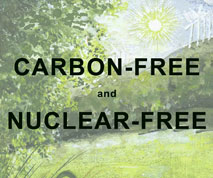
Arjun Makhijani, Ph.D is President of The Institute for Energy and Environmental Research. In this program, Dr. Makhijani discusses his new book, Carbon-Free and Nuclear-Free, A Roadmap for U.S. Energy Policy (2007), which demonstrates that the U.S. and the rest of the world could successfully meet all of its energy needs with renewable energy by 2050. This groundbreaking research should be the boilerplate for all plans to fight global warming. Dr. Makhijani wrote the first study on U.S. energy conservation potential (1971), edited the book Nuclear Wastelands and is the principal author of Mending the Ozone Hole (MIT Press). The Roadmap can be ordered in book form or downloaded free here. This show also includes a clip of a lecture by Dr Caldicott at a 2007 conference.
Listen Now
Posted in Uncategorized | Comments Off
July 28th, 2008
Listen Now

Professor Alan Robock of the Department of Environmental Sciences at Rutgers University is a meteorologist who has studied the effects of nuclear winter since the 1980s. Most recently, he has examined the climatic effects of regional nuclear conflicts and the effects of global warming. In this program, he talks about how a full-scale nuclear war between the U.S. and Russia, which each have 10,000 nuclear weapons, could trigger nuclear winter, while detonating even one-third of their collective arsenals would cause catastrophic climate change. A nuclear war between India and Pakistan would wreak major havoc with global temperatures and agriculture. The show ends with a brief excerpt of a lecture Dr Caldicott gave at an early childhood conference in 2007.
Posted in Uncategorized | Comments Off
July 21st, 2008

Paul Gunter , director of the Reactor Oversight Project at Beyond Nuclear and former director of the Reactor Watchdog Project at Nuclear Information and Resource Service , illuminates the operation, disrepair and vulnerability of U.S. nuclear power plants. This episode also includes an excerpt from the 1983 Oscar-winning documentary, If You Love This Planet, which features Dr. Caldicott giving a lecture about the risks and consequences of nuclear war.
Listen Now
Posted in Uncategorized | Comments Off
July 14th, 2008

David Lochbaum, Director of the Nuclear Safety Project for the Union of Concerned Scientists, about the public health dangers of the 104 aging nuclear power plants in the United States. Hear about near-melt-downs, how terrorists could easily crash planes into the planes or sabotage them from the inside, and how the Nuclear Regulatory Commission fails to ensure community safety. Also includes a short excerpt of a lecture by Dr. Caldicott about the Nuclear Age from If You Love This Planet (1983 Academy Award-winning documentary) with narration from U.S. nuclear propaganda films.
Listen Now
Posted in Uncategorized | Comments Off




















